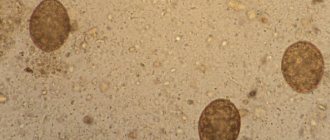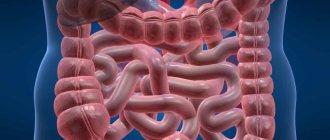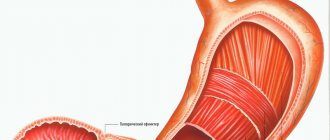In 2005, Australian scientists Robin Warren and Barry Marshall refuted the doctrine of the role of poor nutrition, hyperacidity, heredity and chronic stress in the origin of gastritis and peptic ulcers. They were able to prove that often a variety of stomach problems have a specific culprit - the Helicobacter pylori bacterium.
The bacterium easily adapts to an aggressive environment. In some cases, the immune system copes with infection; if not, the doctor diagnoses “gastritis” or “ulcer”. In 1994, WHO even recognized the connection between the bacterium and cancer of the digestive system, so the presence of Helicobacter pylori in the body is a reason to undergo complex therapy. But how to get tested for Helicobacter pylori, where?
Prevalence of Helicobacter pylori
It is believed that almost 70% of the world's population is infected with Helicobacter. Many people carry the bacteria without knowing it and pass it on to healthy people. Helicobacter pylori can indeed hide in the body for years and begin its “subversive” activities in extremely favorable circumstances: with chronic stress and fatigue, exhaustion of the body, decreased immunity, concomitant diseases, unhealthy diet and unhealthy lifestyle.
As for Russia, registered cases of infection in Moscow alone amount to 60% of the total population of the capital. And this is one of the most developed cities in Russia. Doctors say that in different regions the prevalence of the bacterium reaches 70-90%, which is much higher than in Europe or the United States. This high prevalence is explained by the relatively low standard of living of the majority of the population, neglect of hygiene standards and living in unsanitary conditions.
Helicobacter in children
It is important to know the rate of Helicobacter pylori in the blood of an adult and a child. For what? Statistics provide the answer. In Russia today, 35% of children under 7 years of age and 75% of schoolchildren are infected with the bacterium.
What are the most likely ways children are affected? Often a mother, in whose body Helicobacter has settled, licks the child’s spoon or pacifier. The bacteria can also be transmitted through kissing or sharing utensils.
Healing a child here is half the battle. It is also necessary to identify the bacteria carrier among the adult members of his family. Otherwise, the child is at risk of re-infection. According to statistics, this happens in 35% of cases.
Helicobacter infection in children most often manifests itself as follows:
- Refusal to eat.
- Constant complaints of nausea.
- Unreasonable pain in the stomach.
- Excessive regurgitation of food.
- Bloating.
Indications for diagnosis
Doctors recommend regularly taking basic tests in order to detect and treat disorders in a timely manner. But not everyone does this. As a rule, we only go to the hospital if we are already sick. This is what happens with Helicobacter pylori.
It is imperative to turn to diagnostic methods for bacteria in the body as soon as possible if you have the following symptoms:
- Periodic abdominal pain, usually during or after eating. This is due to stagnation and problems with digestion due to low enzyme levels.
- Painful sensations on an empty stomach, which subside when eating. In this case, you can feel how food goes down the esophagus, and if you drink a glass of water, you can feel how the water flows - this sensation appears more clearly and indicates that there are damaged places on the walls.
- The appearance or increase in heartburn. Single heartburn (thrust of gastric juice into the esophagus with irritation of its walls) is a normal variant, but repeated heartburn requires consultation with a doctor and testing.
- Feeling of heaviness even after eating a small amount of food. In this case, the person feels as if the food has stood up and is not digested, “staying in the throat.”
- Frequent nausea and periodic vomiting that is not caused by other reasons (for example, toxicosis in early pregnancy).
- Constant discomfort in the stomach, aching pain, slight heaviness, loss of appetite. If symptoms appear, but then quickly pass, this may indicate the initial stage of the adverse effects of Helicobacter pylori on the mucous membrane.
- Blood and other unusual impurities in the stool. If an adult can determine what hurts, then in the case of children everything is not so simple. That is why you need to pay attention to the baby’s stool, his general condition and movements.
- Frequently recurring diarrhea, constipation, defecation disorders.
- Increased flatulence and rumbling in the stomach.
All of the above signs do not indicate one hundred percent presence of infection in the body. Such symptoms, both in combination and individually, may indicate the presence of a completely different problem, or even be a variant of the norm in a particular case.
Features of ELISA
The analysis is carried out in government and commercial laboratories, usually in the morning. No special preparation needed:
- Smoking is prohibited half an hour before the procedure;
- last meal 4 hours before the study;
- You are allowed to drink unsweetened water.
We recommend reading:
Stomach ulcer: how is the pathology manifested and treated?
Taking blood from a vein takes no more than a minute, and the test result is ready in 1-4 business days.
There are many indications for performing an enzyme immunoassay for Helicobacter. They are mainly associated with pathology of the gastrointestinal tract and digestive disorders:
- Ulcerative lesions of the gastrointestinal tract along its entire length.
- Superficial gastritis, often its atrophic form.
- Bloating, nausea, vomiting, heartburn, frequent belching.
- Unexplained weight loss.
It is determined whether Helicobacter pylori is normal or not in the relatives of a patient undergoing treatment for an infection. The category of people whose relatives suffered from cancer of the gastrointestinal tract is also periodically analyzed.
Along with the indications, there are also contraindications to the procedure. Helicobacter ELISA is not performed on persons with convulsive syndrome and muscle twitching. When taking blood for analysis, medical personnel select a venipuncture site without accompanying signs of inflammation.
In order for the result of the analysis to truly reflect the person’s condition, it is necessary to prepare for the study.
Preparation does not involve any difficulties or serious manipulations and consists of the following:
- It is forbidden to eat fatty foods the day before.
- It is not recommended to drink alcohol before taking the test.
- The last meal before the study should be taken 8-10 hours before.
- It is not allowed to engage in heavy physical labor the day before the examination.
- The analysis is carried out on an empty stomach; you are allowed to drink water.
- The study is carried out before or after any antibiotic therapy, but not during it.
Preparing for a blood test for Helicobacter using the enzyme immunoassay method involves avoiding fatty foods and alcohol at least 24 hours before. It is also necessary to limit physical activity during the day, including sports. It is necessary to donate blood on an empty stomach, that is, at least 8–10 hours must pass between the last meal and the collection of biomaterial.
The analysis is carried out mainly in the morning, which allows the subject to prepare with the least discomfort. After all, it is forbidden to have breakfast in the morning, you can only drink water, and this will not be so easy for a person with hunger pains. Half an hour before the procedure, you must refrain from smoking.
Diagnostic methods for Helicobacter pylori
What test should I take for Helicobacter pylori? There are several methods for diagnosing bacteria, which differ in accuracy, the need for preparation, processing time for results, and so on. The first thing the doctor will do is take a medical history. The patient will be asked about symptoms, diet and nutrition, concomitant diseases, medical history, pathologies that close relatives have and can be inherited. Only then will the doctor give a direction for a certain type of analysis.
The presence of harmful bacteria in the body can be detected in various ways. If Helicobacter pylori is suspected, the following tests may be prescribed:
- Laboratory blood test for the presence of antibodies to Helicobacter pylori. If antibodies are detected, it means that the body recognizes the bacterium.
- Stool antigen test. The stool test is aimed at identifying the genetic material of the pathogen in the stool.
- Breath test. A rapid analysis will determine the activity of Helicobacter pylori in the stomach based on the composition of exhaled air.
- Gastroscopy for Helicobacter.
- Cytological examination. The method is the most accurate among those listed.
What test should be taken for Helicobacter pylori? To increase the accuracy of diagnosis, it is advisable to take at least two tests. If a bacterium has been identified, then after a course of therapy it is necessary to do a repeat study.
How to get tested for Helicobacter pylori? Preliminary preparation (both the activities themselves and its necessity in principle) depends on the type of research.
How does infection occur and who is tested for Helicobacter pylori?
Helicobacter pylori “lives” in the lower part of the stomach, tolerates the effects of gastric juice well, and is transmitted through saliva. Therefore, infection, as a rule, occurs through close contact or using the same utensils. According to statistics, more than 60% of people living on our planet are infected with Helicobacter, but not everyone has health problems. Why? It all depends on the state of the immune system and the presence of risk factors: stress, bad habits, poor diet. Urgent diagnosis is needed for those who have the following symptoms:
- heaviness in the stomach and heartburn;
- pain in the stomach (especially if it goes away after eating);
- physical aversion to meat food.
How Simply Recommends
Why the medicine doesn’t work The key to successful treatment is, of course, following all the doctor’s recommendations and informing him of all significant changes during therapy. However, a specialist can talk as much as he wants about the regimen and duration of taking the drug, but most patients will still violate these rules. Read more
Relatives of those diagnosed with helicobacteriosis are also at risk.
Enzyme immunoassay blood test for antibodies
This type of study is prescribed to determine the presence of antibodies to Helicobacter pylori in the patient’s blood. In medical practice, it is generally accepted that antibodies to certain bacteria and infections appear for a reason, but only in case of infection as a response of the body’s immune system.
An enzyme immunoassay can only determine Helicobacter if one to three weeks or more have passed since the infection. If the infection occurred just a few days ago, the test may give a false negative result, since the body has not yet had time to react properly to the appearance of the bacteria.
A false positive result can be given for two reasons:
- The human factor, i.e. the mistake of a laboratory assistant who mixed up the research material, wrote the conclusion incorrectly, and so on.
- Recent therapy, during which a person was cured of Helicobacter, but antibodies are still present in the blood. A control test can be carried out no earlier than a month after complex therapy, but even in this case you can get a positive result in the absence of bacteria in the body. In some cases (depending on individual characteristics and some other factors), antibodies remain in the blood for life.
How to take a blood test for Helicobacter pylori? Is advance preparation necessary? On the eve of the study, you should avoid eating excessively fatty foods and drinking alcoholic beverages, and avoid nervous and physical stress. Blood is drawn from a vein in the morning, on an empty stomach. The procedure is painless, but different patients tolerate it differently, so after the analysis it is better to drink sweet tea and eat a piece of dark chocolate.
Analysis transcript
The interpretation of the results obtained is carried out by a therapist or gastroenterologist. The doctor compares laboratory values with clinical data and makes a diagnosis.
The most commonly prescribed test for IgG is the semi-quantitative method. Antibodies are detected in 100% of patients with confirmed Helicobacter pylori infection. Units of measurement – U/ml (number of units per ml of blood serum).
| Positively | Doubtful | Negative |
More than 1.1
| From 0.9 to 1.1
| Less than 0.9
|
To assess the degree of infection, a quantitative IgA test is prescribed. Class A antibodies are detected only in 85% of patients with confirmed helicobacteriosis.
| Positively | Negative |
More than 13.5
| Up to 13.5
|
IgM appears in the blood during the early period of infection and then disappears. Antibodies of class M are determined only in combination with other immunoglobulins.
| Positively | Doubtful | Negative |
More than 40
| 36-40
| up to 36
|
In 17-21% of cases, serological analysis does not show infection even if it is present:
- less than 3 weeks have passed since infection, antibodies have not been formed in sufficient quantities;
- old age of the patient - after 60 years, the activity of the immune response decreases;
- taking cytostatics - drugs that suppress the immune system.
We recommend reading:
Breath test for Helicobacter pylori: types of tests, reliability, preparation and conduct
The interpretation of the enzyme immunoassay result is carried out by a qualified laboratory technician.
A qualitative study can confirm or refute the presence of Helicobacter pylori infection. It will also determine the need for a quantitative test.
- A negative qualitative result for Helicobacter indicates the absence of the pathogen in the blood. No further quantitative analysis will be performed.
- A positive ELISA result is an indication for counting immunoglobulins of various classes in the blood.
If you receive negative test results, it is strongly recommended to repeat the test after two weeks.
Each laboratory that collects blood for ELISA has its own reference values for the concentration of antibodies to the pathogen. When testing for Helicobacter pylori, the norm is recorded on the analysis results form together with the established value for the patient.
A questionable indicator requires re-checking after a few weeks.
Where to get a blood test in Moscow
Where can you get tested for Helicobacter pylori in Moscow? First, you can go to a public clinic. A therapist or gastroenterologist, if deemed necessary, will give a referral to a laboratory for testing. Secondly, you can donate blood to identify the bacteria in any private clinic, for example, Invitro or Litech.
In both cases, the results will be ready the next day, however, in private medical centers you can make an additional payment for urgency and receive a specialist’s conclusion within 1-2 hours. The cost of the analysis will be 500-1000 rubles, depending on the pricing policy of the clinic and the urgency of preparing the results. The test can be done free of charge in a public hospital.
Diseases with similar symptoms
Determination of Helicobacter in the blood is also necessary to exclude the possibility of developing other diseases that are quite similar in symptoms to those caused by this bacterium. Among them, it is important to highlight the following:
- Cancer of the esophagus or stomach.
- Peptic ulcer affecting the duodenum or stomach.
- Inflammation of the esophagus - esophagitis.
- Duodenitis.
- Gastritis.
The analysis also helps determine whether you are at risk. Since Helicobacter is considered a contagious bacterium, it is important to know about its presence in your body to exclude the fact of infection of close relatives and your children.
Stool antigen test for Helicobacter
The stool test is one of the most patient-friendly methods for diagnosing Helicobacter pylori. Firstly, the study does not require personal presence in the outpatient clinic, and secondly, the material is collected painlessly (non-invasively, that is, without damaging the skin, as when drawing blood), in conditions that are comfortable for the patient. So there is a definite answer to the question of what test to take for Helicobacter pylori, for example, for a child - this is a stool test. This analysis is especially convenient for diagnosing the disease in children, the elderly and seriously ill patients.
However, the effectiveness of stool examination in determining the presence of Helicobacter pylori is insufficient. The number of harmful bacteria, if they exist in the digestive system, decreases when passing through the intestines, and the pathogen is exposed to acids. As a result, the test may give a false negative result. But currently, a special method is used with which specialists can determine even particles of Helicobacter genetic material in feces.
How to take a stool test for Helicobacter pylori? For three days, you must completely stop using suppositories; before collecting the material, you cannot stimulate stool with an enema, castor or other oil. A few days before the analysis, you should exclude from your diet foods rich in fiber, containing a lot of dyes and salts, and you should stop using medications that stimulate intestinal function.
Characteristics of the bacterium
The favorite place of localization of Helicobacter is the pyloric region of the stomach. It corresponds to the transition of the main digestive organ to the duodenum. This department has a rather aggressive environment, but this does not prevent the Helicobacter pylori bacterium from carrying out its life activities. It moves due to the presence of several flagella; the peculiarities of its metabolism do not require the presence of flagella.
Gastric juice mixed with hydrochloric acid destroys all bacteria except Helicobacter.
To live in such conditions, the bacterium has developed two defense mechanisms:
- The flagella allow them to be fixed deep in the gastric mucosa.
- The bacterium itself produces ammonia, which completely neutralizes the cauterizing effect of hydrochloric acid. In connection with this mechanism, a breath test for Helicobacter was invented, which captures the gas it produces.
The close interaction of the bacterium with the lining cells of the stomach allows it to literally feed on them, leaving behind toxic metabolic products. Gastric juice rushes into the wound formed by Helicobacter, which further irritates the mucous membrane and the defective area.
Where to get a stool test for Helicobacter pylori
In Moscow, you can do a stool test to detect Helicobacter in both private medical centers and public clinics. Where to get a stool test (Helicobacter pylori) in the capital if you choose a private clinic? K, MC in Maryino, “Capital Medical Clinic”, Clinic “Capital”, “Family MC”, “Paracelsus”, “Good Doctor”, “Medical On Group”, “Clinic of Expert Medical Technologies”, “ABC Medicine”, “ Prima Medica", "Edem", St. Andrew's Hospitals, "K+31" and so on.
A gastroenterologist at the clinic will tell you how to get tested for Helicobacter pylori. You can get a consultation in any private clinic, but for reasons of economy it is better, of course, to get tested in any state clinic - the method is not innovative, so you don’t need special equipment, and there are qualified doctors in district clinics.
As for the cost, the study will cost 500-4000 rubles. The most expensive clinics: “Stolitsa” on Letchika Babushkina, MC on Botkinsky, “Stolitsa” on Arbat. The cheapest places are at ABC Medicine, Doctor Ozone, and Good Doctor.
How to get tested for Helicobacter pylori? Change your diet a little a few days before the test, give up alcohol and some medications. The material must be collected in a clean container; special medical kits for stool analysis can be purchased at pharmacies.
When to get tested after Helicobacter pylori treatment? A repeat study can be carried out 3 weeks after the end of the course of therapy. The attending physician will give specific recommendations.
Breathing urease Helic test
Breath analysis is based on the fact that the bacterium produces special enzymes that can be detected when exhaled. How to get tested for Helicobacter pylori? The patient is asked to breathe through a tube located deep in the mouth. From time to time, the doctor reminds you to swallow saliva so as not to spoil the test results. Typically, two samples of exhaled air are taken.
The main advantages of such a test are its high efficiency, relative safety of the study and convenience for the patient. The test time does not exceed 40 minutes.
Tips for preparing for the test
How to get tested for Helicobacter pylori? Preparation for a breath test requires serious preparation. First, you should slightly modify your diet on the eve of the study:
- exclude legumes, brown bread, cabbage and apples (foods that can cause increased gas formation in the digestive tract);
- give up alcoholic beverages and, on the day of the study, chew gum and cigarettes;
- do not drink liquid an hour before the test;
- Only an early and light dinner is allowed; after 10 pm on the day before the test you can no longer eat;
- in the morning before the test, you need to brush your teeth and rinse your mouth with clean water; you should not use mouth fresheners or rinses;
- The attending physician must be informed about all medications that the patient took 2-3 days before the test.











